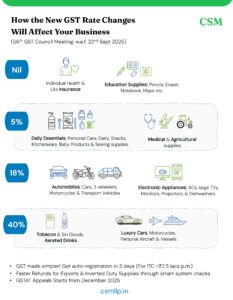GST Gets Simpler: Key Rate Changes from Sept 2025
September 3, 2025

56th GST Council Meeting, held in September 2025, has introduced significant changes to GST rates across various goods and services. These revisions aim to simplify compliance, reduce burden on essential items, and ensure higher taxation on luxury and sin goods. Let’s break down the impact for businesses and consumers.
Individual Health & Life Insurance
Educational Supplies: Pencils, notebooks, erasers, maps etc.
➡ Relief for households and students, encouraging affordability in health and education.
Daily Essentials: Dairy, snacks, personal care, kitchenware, baby products, sewing supplies
Medical & Agricultural Supplies
➡ This keeps household and farming necessities affordable while maintaining tax revenues.
Automobiles: Cars, motorcycles, three-wheelers, transport vehicles
Electronic Appliances: Air conditioners, large TVs, monitors, projectors, dishwashers
➡ Common in mid-range consumption, this rate continues to balance revenue and accessibility.
Tobacco & Sin Goods, Aerated Drinks
Luxury Cars, High-end Motorcycles, Personal Aircraft & Vessels
➡ Heavier taxation on luxury and harmful products to discourage over-consumption and generate revenue.

Apart from rate changes, the Council announced key reforms:
Auto-registration within 3 days for taxpayers with ITC claims below ₹2.5 lakhs/month
Faster refunds for exports & inverted duty supplies through smart system checks
GSTAT Appeals to commence from December 2025 for quicker dispute resolution
Manufacturers & Traders in FMCG, agriculture, and medical supplies benefit from lower rates.
Automobile & Electronics Sectors remain at 18%, ensuring stability.
Luxury & Tobacco Industries face a steeper 40% rate, requiring pricing adjustments.
Exporters & MSMEs gain from faster refunds and easier registration.
The latest GST changes mark a step toward a more equitable and simplified tax structure. Essentials have been made more affordable, while luxury and sin goods will contribute more revenue. Businesses must realign their pricing, compliance, and invoicing systems before 22nd September 2025 to stay fully compliant.
Read the source of this post by clicking here (Recommendations of the 56th Meeting of the GST Council held at New Delhi)
Disclaimer:
This article is for general informational purposes only and should not be considered professional advice. Please consult a qualified expert for advice tailored to your specific situation. The author and website owner are not liable for any errors or actions based on this content.